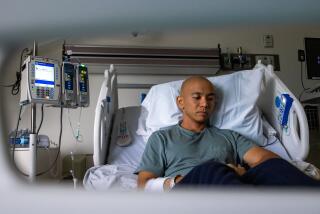Prepares for Transplant, but Donor’s Family Reneges : Liver Patient Dealt a Distressing Blow
- Share via
After waiting nearly a year for a liver transplant, Richard Anderson was elated when his beeper went off in church just as the pastor was bringing the congregation up to date on Anderson’s condition.
Answering the page in the rectory office of the Loving Shepherd Lutheran Church in Gardena, Anderson found UCLA Medical Center in Westwood calling to say that a donor had been found, one that perfectly matched his uncommon blood type, B positive.
Told to mentally prepare for surgery while paper work was completed, Anderson rejoined the congregation Sunday, took communion, received a standing ovation, then went home to await the operation.
It never came.
The elation turned to dejection two hours later when UCLA telephoned and said the donor’s family, which had orally agreed to the transplant, reneged for reasons that were still unknown Tuesday.
It was the first time a prospective donor’s family refused to sign the surgical consent form at UCLA after orally agreeing to the procedure, said nurse Marilyn Hoff, liver transplant coordinator.
Anderson, 40, married with a 10-year-old daughter, could die in less than a year if his liver is not replaced. But he did not criticize the prospective donor’s family.
He was physically and emotionally drained by Sunday’s events, which included gathering at home with family and friends for moral support.
His wife, Inez, and daughter, Holly, had sat next to him on the couch while calls from others came in.
“I’ve been waiting for this for a long time,” Inez Anderson said.
She was packed and prepared to spend the next few days in the hospital lounge.
“The nurses said they would throw me a blanket and pillow at night,” she said.
Anderson, meanwhile, had been sitting nervously, his foot bouncing up and down.
“I want to say . . . I don’t know how . . . it means so much to have my family and friends’ support at a time like this,” Anderson said. “Mentally, I am a nervous wreck right now.”
Then the telephone call came, telling him the surgery was off.
Livers usually come from accident victims who suffer fatal head injuries. Once a patient is declared brain dead, a neurologist generally talks to the family, Hoff said. Family clergy are sometimes consulted.
About 80% of the families approached give oral consent and later sign the form, Hoff said.
Those who don’t consent give a variety of reasons, the most common of which is the refusal to have their relatives disfigured, said Emi Yoshihara of the Regional Organ Procurement Agency, which coordinates organ donations in Southern California.
Normally, a recipient is not called until the consent form is signed and surgery is pending. But in Anderson’s case, the oral consent was considered enough to alert him.
Meanwhile, Anderson waits for another donor. Despite Sunday’s letdown, his spirits are improving, his wife said.
“At least we know the beeper works,” she said with a laugh.
More to Read
Sign up for Essential California
The most important California stories and recommendations in your inbox every morning.
You may occasionally receive promotional content from the Los Angeles Times.













